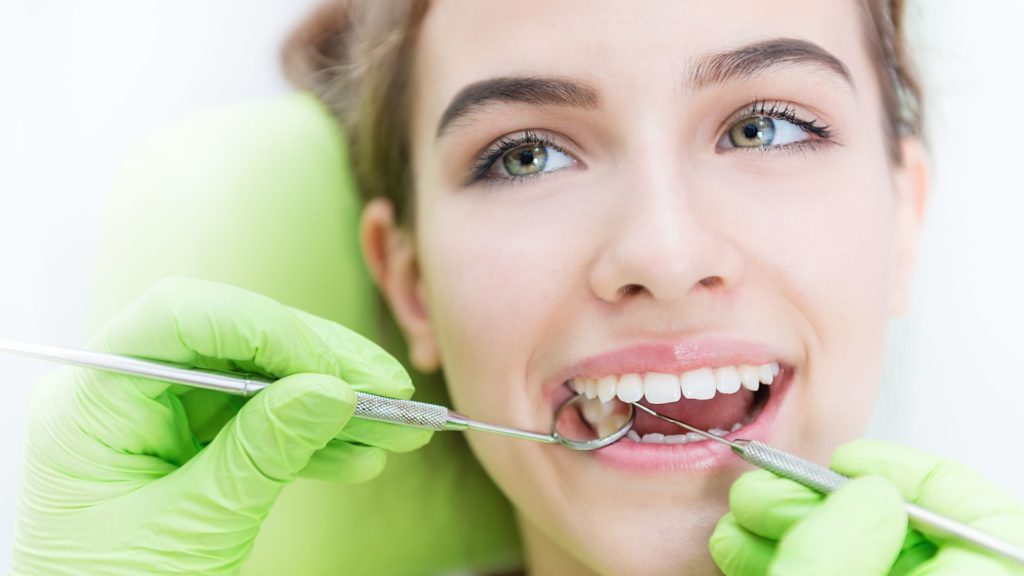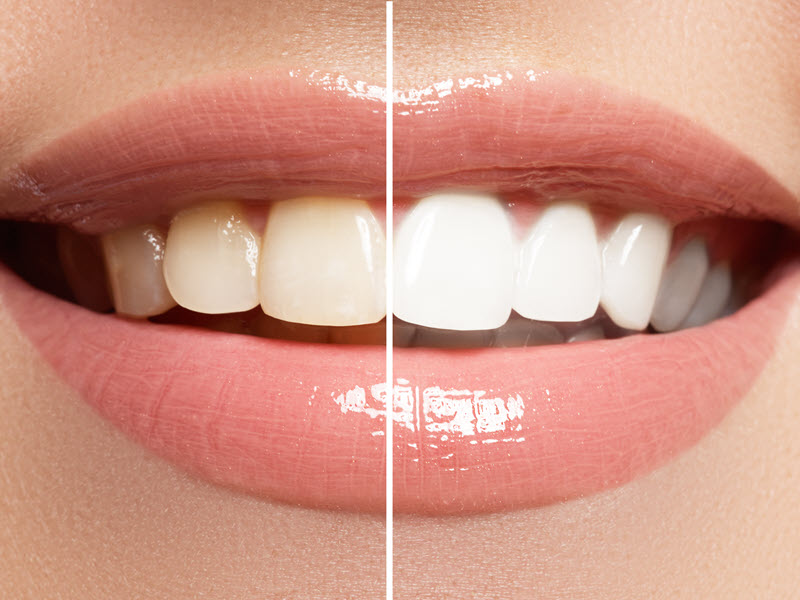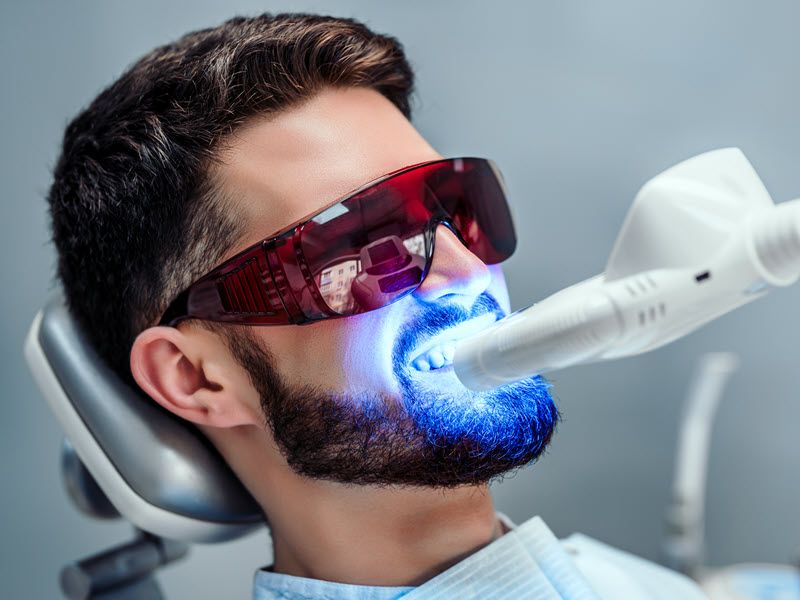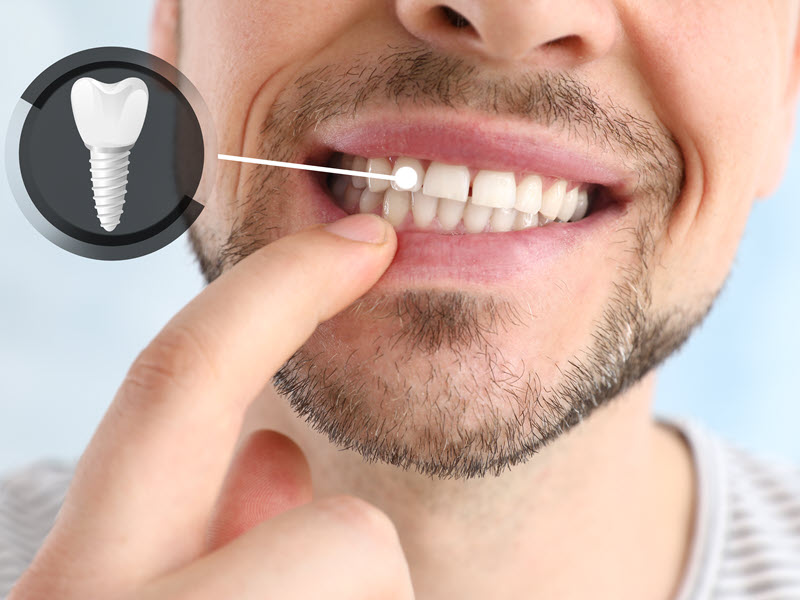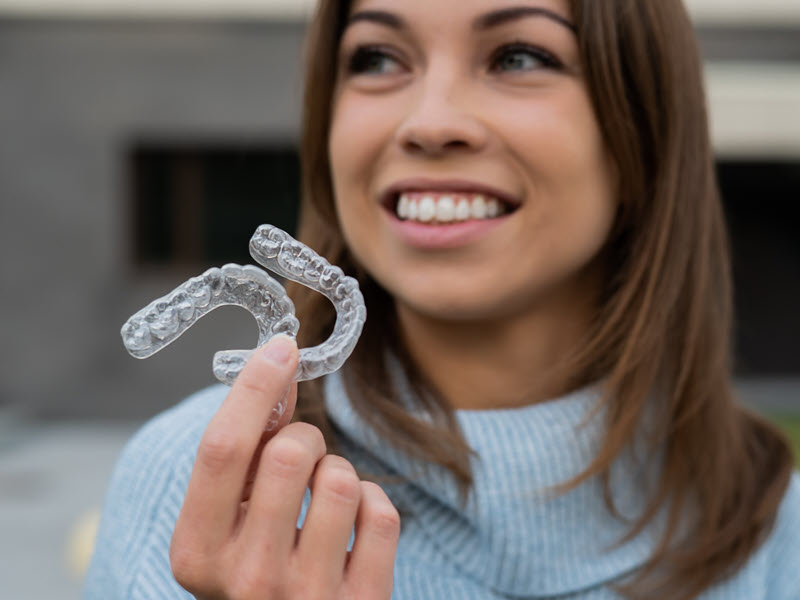Understanding Periodontal Disease
Periodontal disease, also known as gum disease, is a harmful oral infection of gum tissue and bone. It begins when plaque builds up on your teeth, particularly at the gum line. Plaque contains many types of harmful bacteria. If you do not remove plaque by brushing and flossing your teeth, it will harden into tartar. You’ll have to come in to our dental office in Fort Collins to remove tartar.
The early stage of periodontal disease is called gingivitis. If you have gingivitis, your gums may become red, swollen, and prone to bleeding when brushing or flossing. At this stage, soft tissue inflammation may be reversed by improving your oral hygiene routine. This includes brushing your teeth twice a day, flossing daily, and visiting your dentist for regular cleanings.
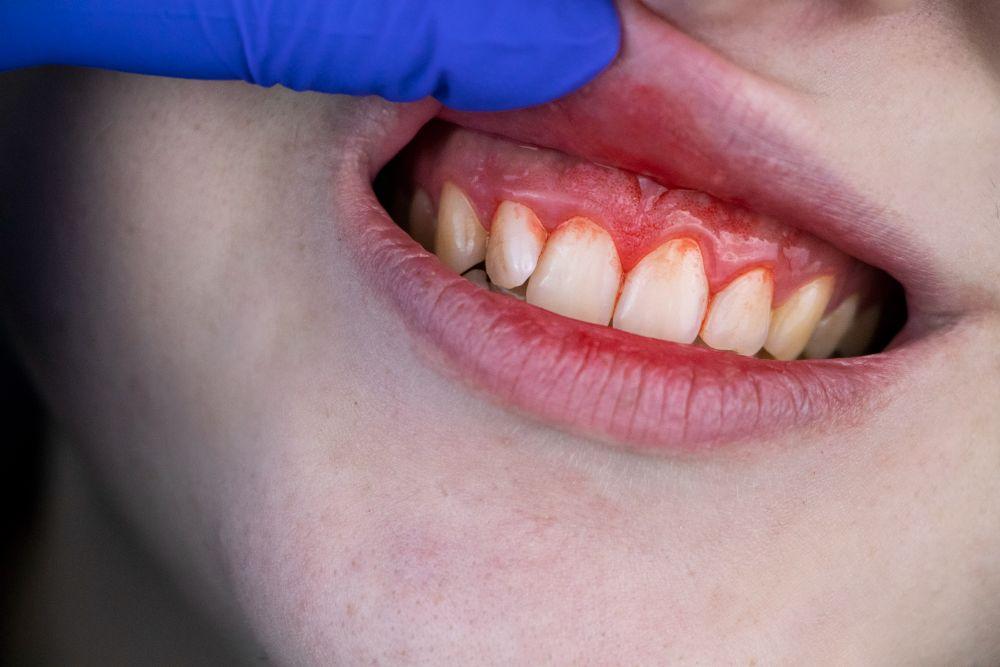
Gum Inflammation and Bleeding is a Sign of Possible Periodontal Disease
If gingivitis goes untreated, it may progress into a more severe form of periodontal disease called periodontitis. In this stage, the inflammation spreads deeper into the supporting bone tissue around your teeth. This can damage the bone and lead to large periodontal pockets and tooth loss if not treated.
To prevent periodontal disease, maintain good oral hygiene and seek regular dental check-ups.

The American Dental Association Video Above Dives Into Common Causes for Bad Breath – Including Gum Disease
Identification And Diagnosis
To identify and diagnose periodontal disease, pay attention to symptoms such as swollen gums, bleeding while brushing or flossing, and bad breath. If you notice these signs, it’s important to consult a dental hygienist or dentist for proper assessment.
Your dentist will first review your medical history to identify any factors linked to the symptoms. Then, they will use a periodontal probe to measure the each periodontal pocket around your teeth. Deep pockets can indicate the presence of periodontal disease.
In addition, your dentist may take x-rays to check for bone loss and other signs of gum disease. Based on these findings, they will determine if you have periodontal disease and its severity. Regular dental check-ups can help catch periodontal disease early and improve your chances of successful periodonal treatment.
Stages Of Periodontal Disease
In the early stage called gingivitis, you may notice bleeding gums after brushing and flossing. Take action to improve your oral care and use a soft toothbrush.
As it worsens, the disease forms pockets around your teeth. Your gums pull away, allowing harmful bacteria to grow. At this stage, a dental professional performs deep cleanings to remove the debris and bacteria.
If not treated, moderate periodontitis occurs. Bone loss starts, putting your teeth at risk. You may feel pain and see receding gums. A dentist can suggest treatments like scaling and root planing to manage the disease.
In the final stage called advanced periodontitis, significant bone loss and tooth loss can happen. You may have loose teeth. You may even have teeth that fall out. Dentists may recommend advanced treatments, such as bone grafting or dental implants, to help you regain your oral health.
To prevent periodontal disease, maintain good oral care, visit the dentist regularly, and take early signs seriously.
Factors Contributing To Periodontal Disease
Taking care of your oral health is crucial in avoiding periodontal disease. Several factors can contribute to this gum infection, including:
- Smoking: Cigarette smoke and other tobacco products wreak havoc on your gums. Quitting smoking is one of the most effective ways to reduce your risk of developing periodontal disease.
- Poor oral hygiene: It’s essential to maintain a consistent oral hygiene routine to keep tooth decay at bay. Brush your teeth two or more times a day. Flossing should be done once per day. Thoroughly clean your teeth to remove plaque and bacteria to keep your gums healthy. Adding a mouthwash may be recommended.

Proper Oral Hygiene, Including Flossing is Essential in Order to Keep Periodontitis Away
- Hormonal changes: Women, particularly during pregnancy, puberty, and menopause, may experience fluctuations in hormones that can increase the risk of gum inflammation and periodontal disease.
- Diabetes: If you have diabetes, take extra care of your teeth and gums. Imbalanced blood sugar levels can weaken your natural defense against gum infections.
- Genetics: Some people are more prone to periodontal disease due to inherited genetic factors. If your family has a history of this condition, be vigilant with your oral health routine.
- Medications: Certain medications may contribute to periodontal disease by drying the mouth or changing the enzymatic balance of your saliva.
Remember, practicing good oral hygiene, leading a healthy lifestyle, and visiting your dentist regularly are the best ways to keep your gums in top shape and prevent periodontal disease.
Treatment And Management Of Periodontal Disease
To treat periodontal disease, visiting a dentist is crucial. They may recommend a comprehensive dental cleaning to eliminate plaque and tartar buildup. This procedure often involves scaling, which removes plaque and tartar from the surface of your teeth and below the gumline.
After dental cleaning, you might undergo root planing. This procedure smooths the root surfaces of your teeth, inhibiting further buildup of bacteria and tartar. It also helps your gums reattach to your teeth, promoting healthier gums. Antibiotics can also be prescribed to control bacterial infections.
In some cases, a periodontist—a specialist in gum disease—may recommend more advanced treatments like flap surgery. This surgical procedure involves lifting the gums to remove deeply accumulated plaque and tartar. It can greatly improve the health of your gums if other treatments have not been effective.
To manage periodontal disease effectively, it is essential to maintain a high standard of oral hygiene. Regular dental visits, brushing and flossing twice daily, and using an antibacterial mouthwash will help prevent the recurrence of periodontal disease. Furthermore, a healthy diet and avoiding tobacco products can also contribute to better gum health.
By following your dentist’s recommendations and committing to a consistent oral care routine, you can actively manage periodontal disease and improve the health of your gums.
Prevention And Maintenance
To maintain your oral health and prevent gum disease, it is essential to maintain good hygiene habits. Start by brushing your teeth twice a day using a toothpaste that contains fluoride. This helps to remove plaque and prevent gum inflammation.
Flossing daily is another crucial step in preventing periodontal disease. It helps in reaching the tight spaces between your teeth and removing food particles that your toothbrush might miss. This way, you can avoid plaque buildup and keep your gums healthy.
Incorporate a quality mouthwash into your routine. Using mouthwash after brushing and flossing can further eliminate germs and bacteria, reducing the risk of periodontal disease. Remember to choose an alcohol-free mouthwash since alcohol can dry out your mouth, leading to bad breath and other oral health issues.
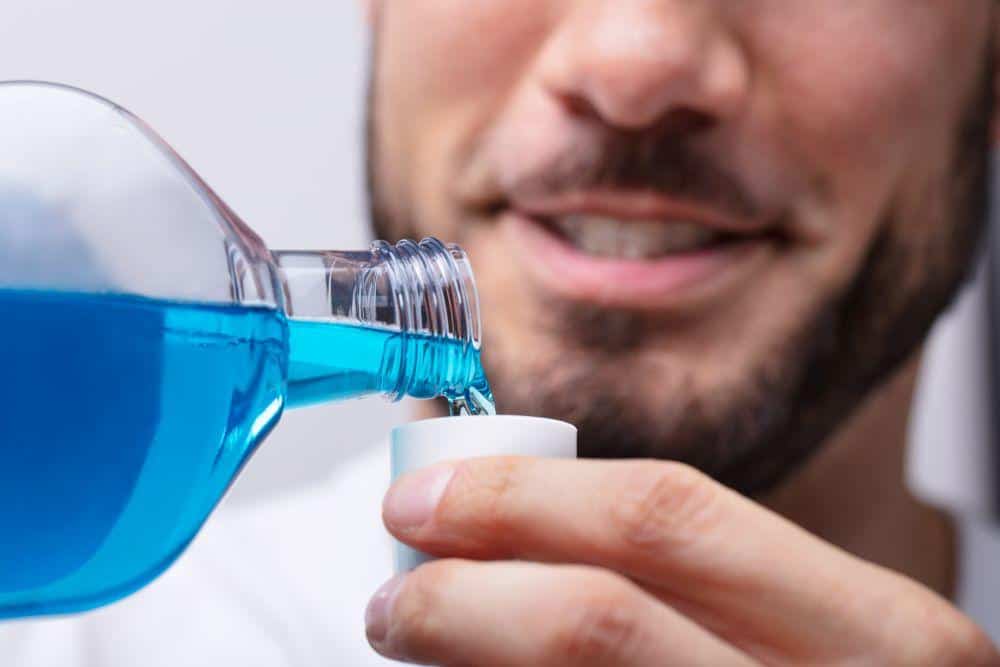
Mouthwash is Extremely Effective at Killing Harmful Bacteria
Eating a balanced diet contributes positively to your oral health. Limit sugary and acidic foods, as they can erode your tooth enamel and promote bacterial growth in your mouth. Eat foods that are rich in minerals and vitamins as these can help to strengthen your teeth and gums.
Scheduling regular visits to your dentist is vital in maintaining good oral health and preventing periodontal disease. Your dentist can examine your teeth, gums, and overall oral health, spotting any signs of potential problems and treating them early.
By following these prevention tips and maintaining proper hygiene habits, you can protect your mouth from periodontal disease and enjoy a healthy, confident smile.
Complications And Overall Health Implications
When you have periodontal disease, the inflammation and infections can damage the gums and bone around your teeth. This may lead to gum recession, tooth loss, and complications beyond the mouth.
If you don’t manage gum disease, it raises the risk of several health issues. For example, there’s a link between periodontal disease and diabetes. If you have diabetes, your body has a harder time fighting infections, like the ones that cause gum disease. At the same time, having gum infections can make it more difficult to control your blood sugar levels.
Your oral health also affects your heart. People with gum disease are more prone to heart disease. Bacteria from your mouth can enter the bloodstream, causing inflammation in blood vessels and increasing the risk of heart attack.
Along with heart disease, gum infections increase your chances of stroke. The inflammation from periodontal disease can lead to plaque buildup in arteries, narrowing the blood flow to your brain.
In some cases, periodontal disease may even be linked to cancer. Research suggests a connection between gum disease and cancers like oral, lung, and pancreatic cancer.
To protect your overall health, pay attention to the signs of gum disease and seek treatment when needed. Regular dental check-ups, coupled with daily brushing and flossing, can help prevent periodontal complications and keep you healthy.
Current Research And Developments
Periodontal disease affects a significant portion of the adult population, with 42 percent of dentate U.S. adults aged 30 or older experiencing periodontitis. In recent years, researchers have made great advancements to understand and develop innovative treatments for this prevalent oral issue.
Scientists at the National Institute of Dental and Craniofacial Research have made progress in reversing periodontitis in older mice by targeting aging-related molecules. This breakthrough provides hope for improving oral health in older adults who frequently suffer from gum disease.
Another approach focuses on guided tissue regeneration, which can help in restoring periodontal support and rebuilding damaged gums. Bone grafting is a technique often used in this process to replace lost bone and stimulate its regeneration.
To enhance periodontal healing, experts are also exploring the use of tissue-stimulating proteins. These proteins stimulate the body’s natural ability to regrow bone and other tissues, promoting faster recovery after surgical procedures.
As you can see, the current landscape of periodontal disease research is diverse and promising. Through these groundbreaking efforts, you may soon benefit from more advanced and effective treatments that will help improve your oral health.
Frequently Asked Questions
How long does it take to cure periodontal disease?
The time it takes to arrest periodontal disease depends on the severity and the individual’s commitment to treatment. With consistent home care and professional dental cleanings, you may notice improvements within a few weeks. However, it is essential to maintain good oral hygiene habits to prevent the disease from entrenching.
Can teeth be saved with periodontal disease?
Yes, with proper treatment, it is possible to save teeth affected by periodontal disease. Treatment options include deep cleaning, scaling and root planing, or, in severe cases, surgery. Dr. Murphy will a treatment plan based on your specifc needs.
Can you recover from periodontal disease?
Yes, you can maintain arrested periodontal disease with proper treatment and good oral hygiene habits. It’s crucial to follow your dentist’s recommendations and maintain a consistent dental care routine, including regular check-ups and cleanings.
Will I lose my teeth if I have periodontal disease?
A tooth extraction isn’t necessarily a given when you have periodontal disease. If detected early, you can undergo periodontal treatment and quite possibly prevent tooth loss caused by periodontal disease. The key to preserving your teeth is early intervention, consistent oral hygiene, and regular dental check-ups.
Can gum disease be cured by brushing my teeth?
While brushing is important for maintaining healthy gums, it is not enough to cure gum disease on its own. Regular dental check-ups, professional cleanings, and additional treatment may be necessary, depending on the severity of your condition.
How to cure gum disease without a dentist.
It is not advisable to attempt to cure gum disease without a dentist. Proper diagnosis and professionaly prescribed gum disease treatment are essential for successful recovery. Home care, such as brushing and flossing, can help maintain healthy gums, but it’s crucial to seek professional advice and treatment if you suspect you have gum disease.
What Causes Periodontal Disease?
Harmful bacteria attacking your gums can cause periodontal disease. This generally occurs due to poor oral hygiene, although people with compromised immune systems may be more susceptible to periodontal disease. It is also possible that in rare instances that harmful bacteria is transferred from one person to another which could potentially lead to periodontal disease.




